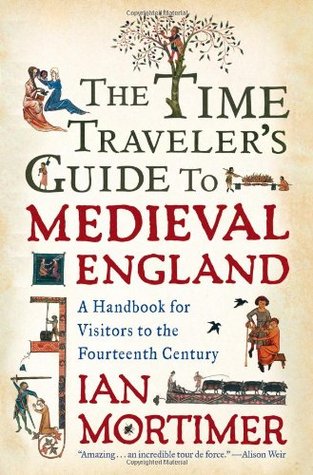 It’s common knowledge that if you want to learn about a foreign country, the first thing to do is invest in a guide book. And thanks to author Ian Mortimer, the same can be said of foreign times.
It’s common knowledge that if you want to learn about a foreign country, the first thing to do is invest in a guide book. And thanks to author Ian Mortimer, the same can be said of foreign times.
The Time Traveler’s Guide to Medieval England is perfect for those intending to visit 14th century England. Everything you need can be found within its pages: what to wear, how to speak, where to stay, and how to avoid running afoul of the law.
Mortimer’s guide covers over 600 years of history in the present tense, bringing the 14th century alive in a way few other history books can.
Permission to squee?
I’m fangirling so hard right now, I can’t even.
Writing an engaging history book is a challenge, especially when the author has to go wide (600 years) and deep (travel, clothing, language, behavior, diseases/medicine, etc.). Ian Mortimer’s Time Traveler’s Guide is a fantastic balance of history and storytelling — something I just can’t resist.
He’s an expert historian, and it shows. Time Traveler’s Guide quotes dozens of primary sources and includes many examples of artwork from the 14th century.
Some of the smaller details — such as how the monetary system operated — got a little dull, but didn’t at all hamper my enjoyment. Other parts — especially the descriptions of plague and leprosy — were intense and hard to stomach.
I wish that Mortimer would write an entire series of guides (Regency England, Revolutionary France, etc.), but sadly he hasn’t. I’ll have to console myself by finding copies of his five other books, the most recent of which is called Medieval Intrigue: Decoding Royal Conspiracies.
What’s your favorite historical period? Would you actually like to visit?
(I read this book as part of Non-fiction November. Click the link to see posts from this and previous years!)







From what I’ve read, the problem with time travel wouldn’t necessarily be local custom, even if you were well-read and familiar with it. The biggest problem would be that your stomach wouldn’t be used to the way food and drinks are prepared. Think about what your stomach does when you go to a foreign country. Now imagine going to a time when there isn’t water filtration, antibiotics, or preservatives.
Ouch.
There are some sections about food in Mortimer’s book. They drank a lot of alcohol (since most water wasn’t really safe), but the food was actually pretty similar to what a lot of people in Europe still eat: meat and potatoes with the occasional vegetable thrown in.
A surprisingly small amount of the deaths of this era are attributable to malnutrition; most people actually ate pretty well.